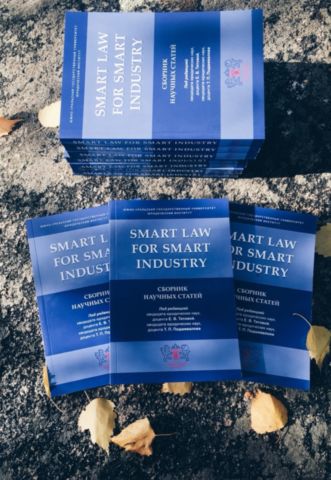The SUSU Institute of Law has prepared and published a collection of scientific articles “Smart Law for Smart Industry” within the framework of a digital transformation and Smart Industry research. The collection was published by the Prospekt federal publishing house.
The authors are exclusively the staff members of the SUSU Institute of Law.
“We have tried to demonstrate the research level, as since 2019 our Institute has chosen a new scientific field for research, that is the digitalization of law,” commented Tikhon Podshivalov, Deputy Director for Research of the Institute of Law.
Industry 4.0 (Smart Industry) includes the following key technologies: big data, internet of things, virtual and augmented reality, 3D printing, quantum computing, blockchain, and more.
.jpg)
The main vector of scientific articles presented in the collection is the idea of the emerging public needs, firstly, in the legal regulation of the means and components of Smart Industry (Industry 4.0) and, secondly, in the formation of new approaches to understand the legal nature of the phenomena related to the digitalization of law.
“The idea of the collection came into being due to the scientific understanding of the components of Smart Industry (Industry 4.0, the Fourth Industrial Revolution) from the legal standpoints, in terms of the structure and the content of law, its branches and institutions. This collection will become annual, and we will invite scientists from other universities to take part in its formation,” said Elena Titova, Director of the Institute of Law.
The law strives to regulate both the introduction of digital technologies and the commercial circulation of the results of their use. However, the goals of ensuring an effective legal regulation of the achievements of the digital industry require significant refinement and comprehensive development of the existing legal tools.
The title of the collection is not accidental. Tikhon Podshivalov, Deputy Director for Research of the Institute of Law, explained: “If the Fourth Industrial Revolution is focused on creating Smart Industry, then it is quite logical to refer to the foundations of legal regulation of digital technologies as Smart Law. Without doubt, we are not talking about an industry or a sub-branch of law, but a kind of conglomerate of legal norms governing the components of Smart Industry. In many ways, this is a convenient and laconic term that contains a word-play that is Smart Law, it helps to explain a whole range of legal phenomena.”
The fourth industrial revolution, like the industrial revolution, is a predictable event. And digital technologies are gradually being introduced into production and everyday life of people. Following them, the changes cover the sphere of legislation as well, which cannot ignore the existing trends.
“Our team of authors has put a great deal of effort into preparing the articles, and we hope that the ideas presented in the articles will find response in the hearts of our colleagues. I would like to thank all the authors who shared their ideas on the pages of this collection,” said Elena Titova, Director of the Institute of Law.




